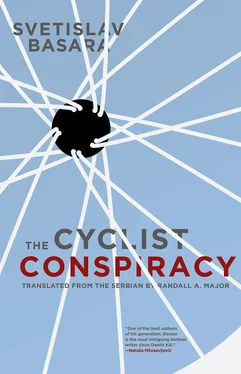Furthermore, a creature convinced of its own finality is not free; it is imprisoned in the boundaries of the body, the limitations of the ego, the borders of a country, ideology and time. The most it can do for itself is to make its imprisonment bearable. So we arrive at pleasure, in whose name supposedly all borders and limitations are destroyed. That is the phantom of freedom of the west, a phantom which proclaims that all is allowed if it brings pleasure. However, pleasures are a limitation of the highest degree; the Land of Luxury remains an empty dream. It is different in the world: if you want pleasure you must have money, and if you want money you either have to work for it or take it, it is a matter of choice, both possibilities are legal. And wherever the lack of freedom and power reigns, institutions necessarily reign as a result. The goal of each of them, if we extract programs and slogan as folklore, is one and the same: maintain the status quo. Institutions are nothing more than a childish attempt to stop time; one does not climb up their ladder thanks to spiritual and moral advancement — as one climbs on Jacob’s ladder — but to the contrary, thanks to spiritual and moral depravity. And so institutions should be deconstructed as associations of the captive, dependent, immature and unlearned; associations that are intended for the battle against all freedom of personality, against every genuine action. That is the way it has always been. And that is how the so-called “humanists” will oppose the construction of the Grand Insane Asylum ; they will attempt to stop the fulfillment of their own dream. For, we are planning a city in which evil will spread to its most extreme limits, to the border where it will — having no where else to go — begin to destroy itself.
I am familiar with a few details of the project and I believe that all of this is rational, too rational. You cannot plan an insane asylum or prison rationally, because insane asylums and prisons are not rational institutions. They only serve to defend the rational Earthly City from the irrational. However, by excluding all institutions, by melding them into a single one — into an ecumenical madhouse — the irrational forces of the spirit will penetrate into the world and purify it with its redeeming fire.
Note:
The speech of the Grand Master was given in September, 1937. On that occasion, all members of the brotherhood, no matter where they were, fell into synchronized sleep and gathered at the oneiric Cathedral of the Holy Spirit, at which time a small celebration was held in honor of the reconstruction of those parts of the cathedral damaged in the attack of the commandos of the Traumeinsatz .
L. LOENTZE. THE MADNESS OF ARCHITECTURE — THE ARCHITECTURE OF MADNESS
1
When, huffing and puffing, the messenger of the Grand Master delivered the orders for me to write a paper dedicated to the study of space, I remembered a few details of a letter which I was sent many years ago by Dr. Çulaba Çulabi. In spite of that, I found myself in a dilemma. I knew that a generalized, practically undefined topic does not demand exactness or credibility, that the goal of research is purely subjective and that it will lead me in quite a different direction, revealing things to me that I do not want to find out, just as the appearance of Dr. Çulabi sent my life in a direction I was not expecting, at a time when I still ran a very profitable engineering office, had a lovely house, and respectable friends with whom I played tennis on Sundays. Dr. Çulabi showed up one day in my studio. He said that he, Çulabi, was a representative of the IMPEX COMMERCE Company; he had heard praises of my work and wanted to hire me for a big job that his company had taken over. If I thought his name was strange, the job he proposed to me was even stranger. Namely, with a deadline of ten months, I was to draw up the plans for a Circular Psychoanalytic Center with 15,000 offices; then the plans for the interior of Napoleon’s study (in 450 copies), and finally a plan for the torture chamber of the Holy Inquisition, complete with the devices for torture. I said that it was a really big job and that I had to think about it. Çulabi had nothing against it. His rather strange appearance did not fill me with confidence. I checked the business records of the IMPEX Company and I found out that it was reputable, and also that Çulabi was indeed a representative of the company.
The next time Çulabi visited me, I told him that I would accept the job. I offered him some cognac (which he refused) and coffee (which he accepted), and then we got down to signing the contracts. That was the last time I saw Dr. Çulabi in the waking world. But that same evening when I fell asleep, I dreamed of him in an unfamiliar town; he was standing under the eaves in front of a dilapidated house, and he was obviously waiting for someone because he kept glancing at his watch. When I approached him, he said that I was late. He took me into an empty tavern (I remember that it said EVROPA in peeling black letters above the door), he offered me a seat, and then he talked to me for a long time about Byzantium, bicycles, real and false eternity, and I remember that I was horribly bored in my dream. He also told me that the contract we signed in reality was really important, but that I had been hired because of a much more important job, for the repair of a cathedral that had been damaged during the war by some Nazi commandos. Then he told me that, from that night onward, I was a member of a certain sect, the Evangelical Bicyclists of the Rose Cross. I argued with him and said that no one recognizes contracts made in dreams, and that I had no intention whatsoever of being a member of any kind of sect. Çulabi smiled mysteriously. “It isn’t up to you,” he said. “You don’t choose, you’re chosen. But you just don’t get it, I see. So, tomorrow you’ll break two timepieces.”
When I awoke, I remembered the dream in detail and laughed: a dream is just a dream. Still, I was upset, and I could not figure out why. In front of my office, I looked at my watch. It had stopped. I tore it off my hand and — beside myself with anger — slammed it down on the sidewalk, remembering Çulabi’s threat in my dream at that very instant. I went into a nearby bar, drank two cognacs, gathered my thoughts and went to my office. For a while everything was all right. Concentrating on my work, I forgot all about the dream and the broken watch. However, the wall clock began to chime twelve. Seven, eight, nine… I counted silently, attempting to overcome the rage that was growing in me. I did not manage; I grabbed an ashtray from the desk and flung it. The glass on the clock broke, the pendulum stopped swinging. My fellow workers looked at me like I was a madman, which I was to some extent. I mumbled a few words of apology, said that I was not feeling well, that I was nervous and exhausted, and I left the office. Later, when I had come to my senses, I called my doctor on the telephone, described what had happened to me (saying nothing of the dream), and he recommended a certain Dr. Schtürner to me, a reputable psychiatrist, a student of Carl Gustav Jung. He also told me not to worry, that my spiritual health was all right, and that the whole thing was most likely the consequence of psychological exhaustion.
The next day, I did not go to my office. I had an appointment with Dr. Schtürner at eleven in the morning. I was rather upset because that night I dreamed Çulabi in that same town; he was leaning against a linden tree (in full bloom), laughing out loud and saying nothing. I thought that, regardless of the financial consequences, I should break the contract with IMPEX COMMERCE, but I changed my mind: that would be a sure sign that I had gone completely mad; I cannot break contracts with customers just because I am dreaming their representatives. But I decided to tell Dr. Schtürner everything.
Читать дальше












